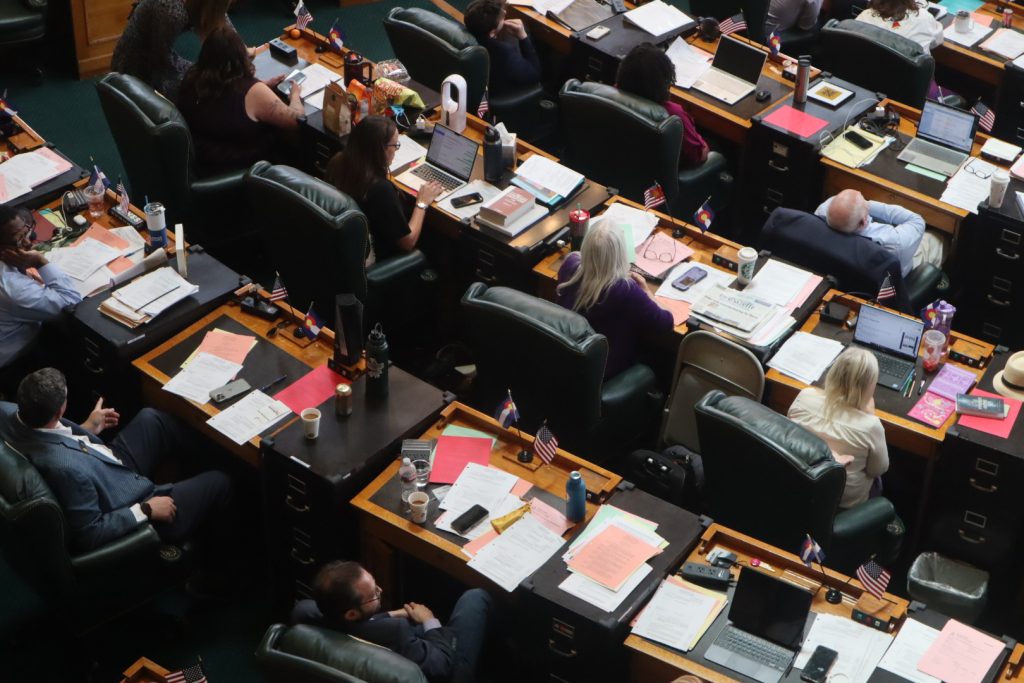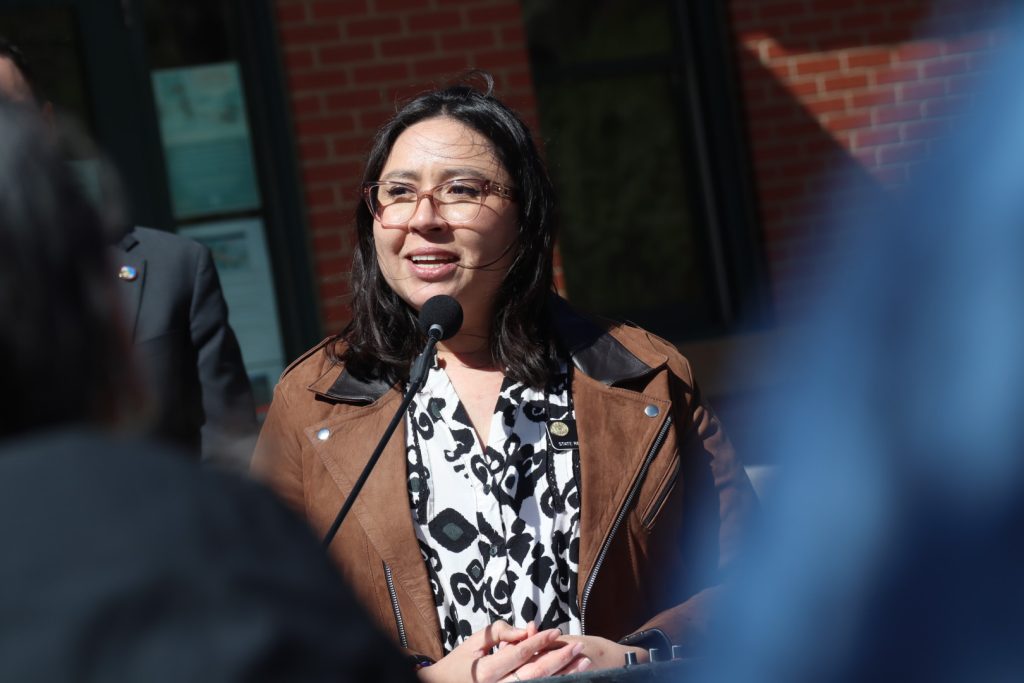Colorado Democratic lawmakers, including from the Western Slope, face transparency questions after attending Vail retreat with lobbyists
Description
A group of Democratic Colorado lawmakers is continuing to face questions about transparency after attending a retreat with lobbyists earlier this month in Vail.
At least 17 state Democrats took part in the retreat, which was held over the Oct. 4 weekend at the Sonnenalp Hotel, as first reported by The Colorado Sun. The lawmakers are part of the Colorado Opportunity Caucus, which formed as a nonprofit at the beginning of this year.
The caucus is made up of several members of both the state House and Senate who are generally considered to lean more moderate. That includes Sen. Dylan Roberts of Frisco and Rep. Meghan Lukens of Steamboat Springs, both of whom attended the gathering.
The event sparked blowback from more progressive Democrats and their allied groups, who viewed it as backdoor dealings with powerful industry lobbyists. Some of the lobbyists who attended represent clients like Xcel Energy, the Colorado Association of Realtors and GEO Group, a private prison contractor, according to reporting by the Sun.
Both Dylan Roberts and Lukens were asked about why they attended the retreat and their response to the backlash, to which they provided written statements highlighting the purpose and goals of the Opportunity Caucus.
“I represent one of the most economically, geographically, and politically diverse districts in the Colorado State Senate — one whose vast majority of voters reject purity tests from the far left and far right,” Dylan Roberts said. “While my involvement has been limited, I believe the Opportunity Caucus was created to foster thoughtful, good-faith policy discussions that focused on results over politics.”
Dylan Roberts added that similar groups have been formed in other state legislatures and that he is “hopeful that any division and misunderstanding this is creating can be overcome by focusing on our common values and collective desire to help all Coloradans while respecting that we come from varying backgrounds, life experiences, and districts.”
Lukens said the caucus’ main goals are around affordability and the economy.
“We are focused on supporting small businesses and entrepreneurs, modernizing the state’s infrastructure, and creating good-paying jobs,” Lukens said. “Members of the Opportunity Caucus are defined by a collaborative approach and a focus on finding practical solutions to move Colorado forward.”
The caucus’ chair, Sen. Lindsey Daugherty of Arvada, did not respond to multiple requests for comment about the retreat. She told the Sun that lawmakers’ discussions weren’t about policy or potential legislation, but instead the goals and future of their caucus and the Democratic Party at a time when many voters are souring on Democrats.
Daugherty said the lobbyists who attended were an “educational component of the retreat,” and that a lawyer was present to ensure everything that occurred was legal.
Dylan Roberts, in his statement, said he believes the caucus’ leadership is following all state and federal laws regarding financial contributions.
“At the same time, I support ongoing efforts to provide our colleagues and the public with more information about caucus fundraising, operations, and priorities,” he said.
When asked about how the incident reflects on the Democratic Party, House Speaker Julie McCluskie, through a spokesperson, declined to comment.
Open meetings law likely not violated, but concerns remain
Colorado Freedom of Information Coalition Executive Director Jeff Roberts, whose organization advocates for government transparency, said it’s reasonable that the meeting would raise questions.
“What are legislators normally talking to lobbyists about? They’re talking about possible legislation,” he said. “I think people do want to know who is trying to influence the legislature.”
But Jeff Roberts said it’s unlikely that lawmakers violated the state’s open meeting laws.
That’s largely due to changes lawmakers approved to the state’s opening meetings laws in 2024, which narrowed the definition of what is considered “public businesses,” and therefore subject to public view.
Before the 2024 changes, a meeting of two or more legislators was considered “public business” if there was a demonstrated link between the meeting and the policy-making powers of those in attendance. That definition still applies to local public bodies and state public bodies, but exceptions were made for the legislature, according to Jeff Roberts.
The 2024 changes narrowed that definition for lawmakers to instances where legislation is being introduced or draft legislation is being discussed by committees, either during a legislative session or in the interim.
<figure class="wp-block-image size-large">
 <figcaption class="wp-element-caption">Colorado lawmakers are pictured on the House floor inside the state Capitol on Aug. 25, 2025.</figcaption><figcaption>Robert Tann/Summit Daily News</figcaption>
<figcaption class="wp-element-caption">Colorado lawmakers are pictured on the House floor inside the state Capitol on Aug. 25, 2025.</figcaption><figcaption>Robert Tann/Summit Daily News</figcaption>The definition also applies to discussions before a statutory committee, any type of interim committee, or a committee of reference. But it does not include discussions that are “by nature interpersonal, administrative, or logistical or that concern personnel, planning, process, training, or operations,” according to the revised law.
“Basically, what they said is if nothing’s coming up before a committee, then we can go ahead and talk all we want outside of public view,” Jeff Roberts said, adding he believes it would be “very hard to challenge” the legality of the Vail retreat.
Jeff Roberts said it’s “still not perfectly clear that a meeting like this would have been subject to the open meetings law,” even before the changes in 2024.
“But the bottom line of all this is you have to take their word for it about what was discussed behind the walls of a fancy hotel in Vail,” he said.
Lack of funding disclosure
Progressives have also denounced the lack of transparency from the Opportunity Caucus around who funded the retreat in Vail.
Colorado law generally limits lawmakers’ ability to accept gifts and payments. It is also illegal for lobbyists to provide gifts, food and beverages to a lawmaker or to cover a lawmaker’s expenses, though they are allowed to donate to candidates’ campaigns.
The Colorado Opportunity Caucus, however, is a nonprofit, meaning it can accept donations and does not have to disclose its benefactors. Caucus members also pay dues to the caucus, but the group has so far declined to name its donors when asked by media outlets.
The Sun reported that One Main Street Colorado, a nonprofit whose stated mission is to “rebuild Colorado’s middle class” and strengthen the state’s economy, approved $25,000 to cover hotel rooms for the Opportunity Caucus’ Vail retreat.
One Main Street has, in the past, funded more moderate candidates in state races through its PAC, and has also at times declined to disclose its donors.
Rep. Elizabeth Velasco, a Glenwood Springs Democrat, said the lack of disclosure over which groups and people are funding the Opportunity Caucus is a “major flag, and I think it’s a bad look for Democrats right now.”
Velasco is not a member of the Opportunity Caucus and did not attend the Vail retreat. One Main Street also endorsed her Democratic primary challenger in the 2024 General Election.
<figure class="wp-block-image size-large">
 <figcaption class="wp-element-caption">State Rep. Elizabeth Velasco, D-Glenwood Springs, speaks in Georgetown during a bill signing ceremony on May 15, 2025. Velasco, who represents several rural resort communities, was a lead sponsor of a sweeping immigrant protections bill passed this year by state Democrats.</figcaption><figcaption>Robert Tann/Summit Daily News</figcaption>
<figcaption class="wp-element-caption">State Rep. Elizabeth Velasco, D-Glenwood Springs, speaks in Georgetown during a bill signing ceremony on May 15, 2025. Velasco, who represents several rural resort communities, was a lead sponsor of a sweeping immigrant protections bill passed this year by state Democrats.</figcaption><figcaption>Robert Tann/Summit Daily News</figcaption>It’s not uncommon for lawmakers to form nonprofit caucuses that accept large donations. Velasco is the co-chair of the Colorado Democratic Latino Caucus, which, like the Opportunity Caucus, is a nonprofit that is not required to disclose its donors.
However, when asked by the Sun, the Latino Caucus released a list of donors who gave at least $1,000 this year and last. That list included Amazon, Deloitte Consulting, Salesforce, Xcel Energy and the dialysis company DaVita, as well as food and hospitality groups.
“The funds that we received, we were asked about it, and released that,” Velasco said. “These corporations are not part of our agenda. They’re not coming to our retreats to influence what issues are part of our pillars or part of the bills that we endorse.”
Velasco said a key difference between her caucus and the Opportunity Caucus is its nonprofit status.
The Latino Caucus is a registered 501(c)(3) organization, which, among other thin




